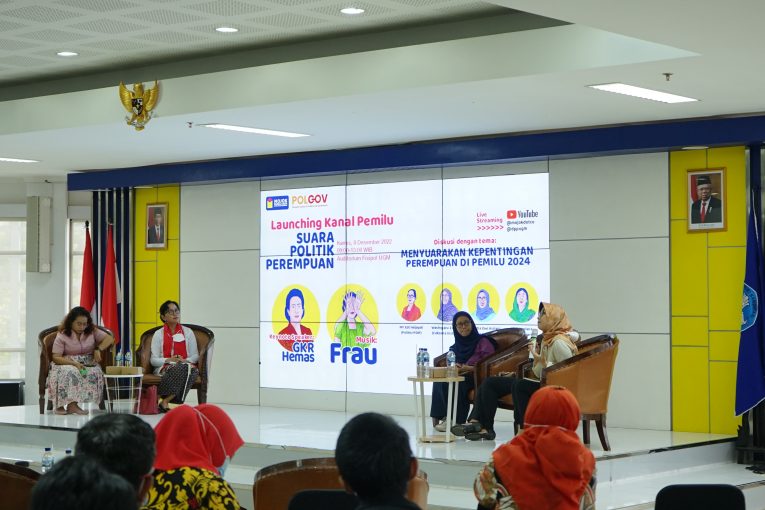
Yogyakarta, December 8th 2022─Towards the political year of 2024, the Department of Politics and Government (DPP) together with the online media mojok.co launched an election channel entitled ‘Women’s Political Voice’ on Thursday (8/12) at the Auditorium of Fisipol UGM. The launch of this channel is one of the efforts to voice women’s interests in the political arena, especially elections. This election channel is a strategic collaboration in which political education can be conveyed in a more popular way and with a wider reach.
Even though development between women and men in the Special Region of Yogyakarta (D.I. Yogyakarta) shows the smallest gap, gender equality in the political arena has yet to be achieved. This was conveyed by Erlina Hidayati Sumardi, Head of the Yogyakarta Women’s Empowerment, Child Protection and Population Control (DP3AP2) Office when giving a speech. “This channel is a space for broad expression for women or anyone who believes that women’s role in Indonesian politics is very important,” said Erlina. My Esti Wijayanti, a politician from the Indonesian Democratic Party of Struggle (P-DIP), also underlined the importance of women’s presence in the legislature so that they can witness and be directly involved in policy formulation.
Gusti Kanjeng Ratu Hemas was also present to give a Keynote Speech regarding the challenges of the 2024 Election. “When we talk about the 2024 Election, it is clear that the challenges are more difficult,” said GKR Hemas. According to her, these challenges lie in terms of regulation, culture, inconsistencies in the women’s agenda, to the lack of organizations that are vocal about voicing women’s issues in elections.
In addition, challenges are also found in defining women’s involvement in politics. “Women’s participation is just biological, in the context of ideology and substance it is not unraveled,” said Desinta Dwi Asriani, a lecturer of the Department of Sociology UGM. According to her, the perspective that sees women’s participation only quantitatively needs to be improved. More than that, the substance is also something that needs to be parsed more deeply.
Furthermore, Dina Mariana, from the Institute for Research and Empowerment (IRE), explained that the cultural aspect is also a challenge for women’s participation in politics. “To achieve equality is difficult because we live in a patriarchal (culture) and masculine space,” explained Dina. The situation is further exacerbated by the intervention of money politics. “The investment of women over the years can be wiped out with envelopes,” she added.
In line with Dina’s opinion, Wasingatu Zakiyah, from the Caksana Institute, witnessed how money politics plays out at the grassroots level. According to him, the people who will vote in the general election or local election must have the courage to reject money politics. In addition, legislative candidates must also be given space to enter at the grassroots level to voice their vision and mission.
In line with Dina’s opinion, Wasingatu Zakiyah, from the Caksana Institute, witnessed how money politics plays out at the grassroots level. According to him, the people who will vote in the general election or local election must have the courage to reject money politics. In addition, legislative candidates must also be given space to enter at the grassroots level to voice their vision and mission.
